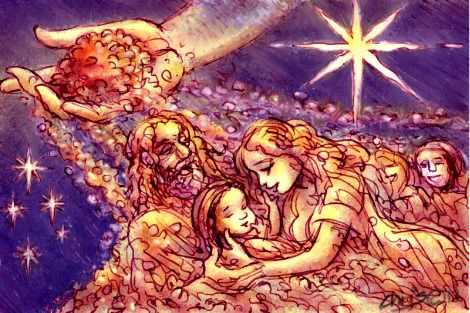 In Bendigo, at a St Vincent de Paul Society forum for Anti-Poverty Week this year, Vicki Clark, Mutti Mutti Woman and Coordinator of Aboriginal Catholic Ministry Victoria, shared the red earth from her mother's Country, inviting all of us to cradle it in our hands. It was beautiful to hold the red earth from Mutti Mutti Country in our hands.
In Bendigo, at a St Vincent de Paul Society forum for Anti-Poverty Week this year, Vicki Clark, Mutti Mutti Woman and Coordinator of Aboriginal Catholic Ministry Victoria, shared the red earth from her mother's Country, inviting all of us to cradle it in our hands. It was beautiful to hold the red earth from Mutti Mutti Country in our hands.
Adam is the name in the ancient Hebrew writings for the first human. His name comes from adamah, the word for earth or dust. This word is also related to the word for blood and the word for the colour red. It was beautiful to hold the red earth from Mutti Mutti Country in our hands because it reminded me of the meaning of dirt and of blood and of being human. In calling us to hold the red earth in our hands Vicki was inviting us into a sacramental encounter. The God of the bible is unequivocally on the side of all who are oppressed and dispossessed.
In the play Bran Nue Dae there is a memorable scene where a boy says he is ashamed to approach the girl he loves because he is dirty. The older and wiser Uncle Tadpole responds with laughter and the famous exclamation that 'We're all dirty!' This is a beautiful evocation of the common ground from which all of us, as human beings, come and which, rather than ever allowing for a social order built on inequality, should be the solid basis for an organisation of society and the economy that is both equitable and respectful.
The people of God are not an ethnic group or even a religious group. They are the scattered and crushed. They are the ones who are treated like dirt, who are humbled and humiliated by the historical structures of inequality, inequality that is built especially on class, gender and race. They are the colonised and the exploited, the despised and the ignored.
As that magnificent group of poets known as Isaiah exclaim: 'What do you mean by crushing my people, by grinding the face of the poor?'
I remember some years back driving out to Ryleston with my family to meet some friends. On the way we saw some stunningly beautiful country but we couldn't help feeling a sense of unease that we couldn't quite explain. This unsettling feeling remained with us the whole time. When we got home we consulted our battered copy of Bruce Elder's Blood on the Wattle, an extremely accessible introduction to the hidden history of some of the massacres of the First Peoples across Australia, which should be compulsory reading for high school students.
The country we had driven through was indeed beautiful but it was soaked with the blood of men, women and children who had been driven off cliffs and hunted down in an effort to clear the rich Wiradjuri land of the Wiradjuri People. Without realising it we could hear the sound of our sister's and brother's blood crying out to us from the land: 'Listen to the sound of your brother's blood crying out to me from the ground.'
The incarnational heart of the Christmas story is a reinforcement of this identification that we find throughout the Hebrew scriptures that God is humanity hurt, which is why the child born on the fringes of society inevitably ends up executed as a dangerous outcast, an object of derision for the powers that be.
But this God is also a creator and he who is torn down is also he who is raised up.
The First Peoples were pushed from their Country. Dispossession and historical disadvantage are the toxic fruits of colonisation. Throughout history and across the globe, people are pushed from land that is held in common. The commons are transformed into vehicles of profit instead of sustenance for the people. The excluded, however, do not disappear. They rise from the dead. And inasmuch as they rise from the dead we rise from the dead with them.
This is the creative power of the oppressed. It is the power to create a new kind of society in which oppression is no longer the rule and dispossession is no longer the basis for the economic order.
One of the capitalist system's achievements is to have concealed the notion of capitalism itself.
So much so, that when you read the words 'capitalist' and 'capitalism' you might immediately assume that the piece of writing in which they occur is somehow 'radical' or 'militant'!
It is not generally considered normal or even necessary to refer to capitalism by name, even when the naming is not accompanied by a critique. We have come to expect the only references to capitalism (outside academic or theoretical texts) will likely come from those who hate it or those who hate those who hate it.
To name the capitalist system is to acknowledge that it is a system. It was not always thus. It came about because of a number of significant changes in the way people produced especially in the area of technology, causing the previous economic system (feudalism) to be outgrown, as it were, to actually fetter and inhibit the creative potential, particularly of the incipient entrepreneurial class.
To name the capitalist system is to therefore acknowledge its historicity. It did not come down from the sky. It is not natural. It is however 'natural' to feel like it is the best of all possible systems for those within it as a system. It is also 'natural' to find it hard to imagine that it could ever possibly end. But then it was just as 'natural' for a peasant (or a noble) to find it unthinkable that there would ever be a time when Feudalism ceased to be.
But I need to introduce a caveat on what I've just said. See, you probably don't feel like capitalism is the best of all possible systems if you are dehumanised by it. If you are left out of the prosperity in a prosperous country or you are trapped in the informal economy in one of the worlds growing number of growing slums, you are well and truly unlikely to feel like capitalism is working out.
The point out of this reflection is very simple. It is easily divided into two distinct but deeply related parts:
1. That the economic system we live in can be named, described and understood.
2. That the limitations of the system are most strongly revealed in the condition of the excluded and exploited.
These two points provide us with a choice.
Either the system by which wealth is generated and distributed is accepted as a given and the people who fail to benefit from the system are ignored or made to change their behaviour, which is construed as being the cause of their exclusion.
Or the people who are left out and pushed out join together to tell their collective story of exclusion and dispossession and joined by others who choose to take their side, call into question the effectiveness of the system and work towards changing it.
As the 1975 Henderson Inquiry into poverty found: 'If poverty is seen as a result of structural inequality within society, any serious attempt to eliminate poverty must seek to change those conditions which produce it.'
And as the groundbreaking 1996 Australian Catholic Bishops' Social Justice Statement argued: 'In the main, people are poor not because they are lazy or lacking in ability or because they are unlucky. They are poor because of the way society, including its economic system, is organised.'
This much is clear: when it comes to the experience of exclusion and exploitation, if people do not tell their stories there will always be those who, in fidelity to the first option, will tell their stories for them, thereby radically altering the truth.
Recently, we have seen Francis, Bishop of Rome, choose this very subject as the focus of his apostolic exhortation, Evangelii Gaudium:
Just as the commandment 'Thou shalt not kill' sets a clear limit in order to safeguard the value of human life, today we also have to say 'thou shalt not' to an economy of exclusion and inequality. Such an economy kills. How can it be that it is not a news item when an elderly homeless person dies of exposure, but it is news when the stock market loses two points? This is a case of exclusion.
Francis also blasted the so-called trickle-down economic theories:
Some people continue to defend trickle-down theories which assume that economic growth, encouraged by a free market, will inevitably succeed in bringing about greater justice and inclusiveness in the world. This opinion, which has never been confirmed by the facts, expresses a crude and naïve trust in the goodness of those wielding economic power and in the sacralized workings of the prevailing economic system. Meanwhile, the excluded are still waiting.
The Christmas story is a whisper from the edges that another kind of world is possible.
There are those for whom this message is unwelcome, those for whom it will be scorned as being naive at best and dangerous at worst, those for who it will be regarded with warmth and those for whom it is an urgent enkindling of hope in the face of degradation and despair.
 Dr John Falzon is a political sociologist, poet and author of The Language of the Unheard(2012). He is Chief Executive Officer of the St Vincent Paul Society National Council of Australia.
Dr John Falzon is a political sociologist, poet and author of The Language of the Unheard(2012). He is Chief Executive Officer of the St Vincent Paul Society National Council of Australia.
Original artwork by Chris Johnston.